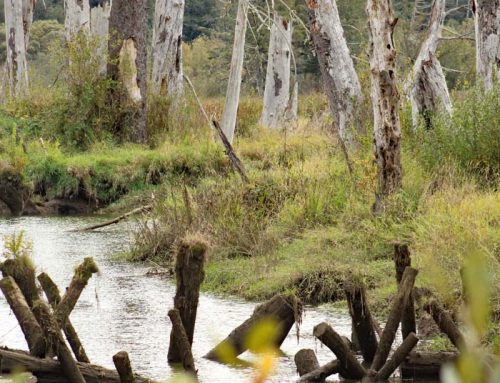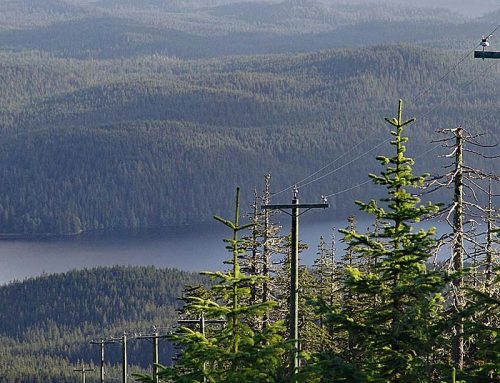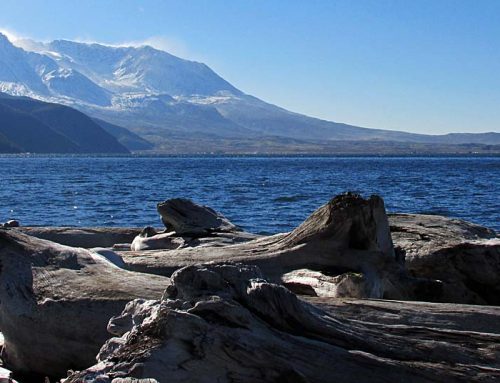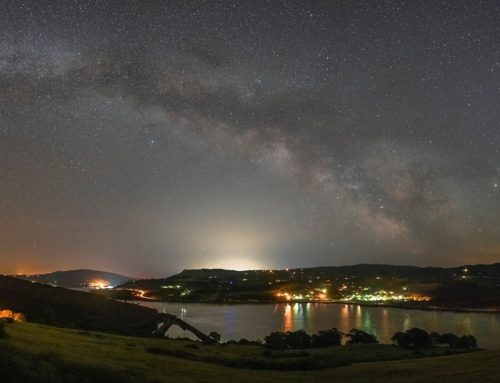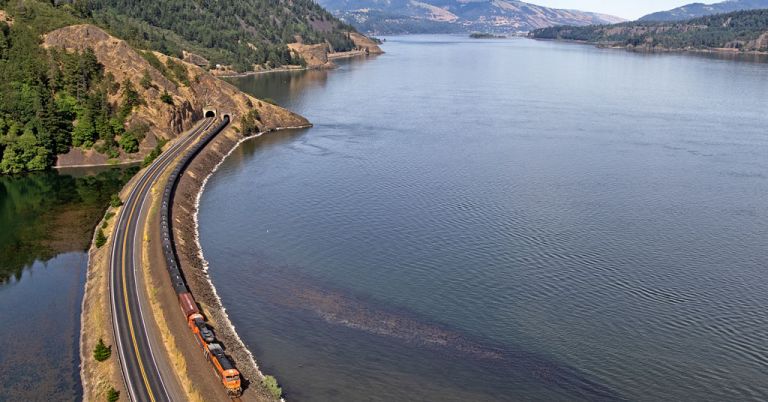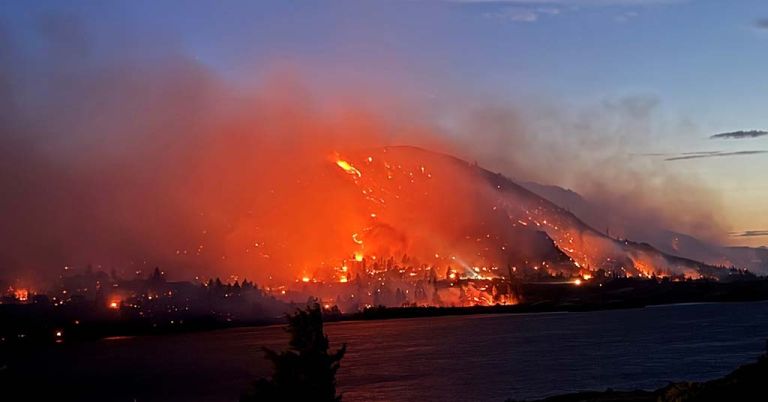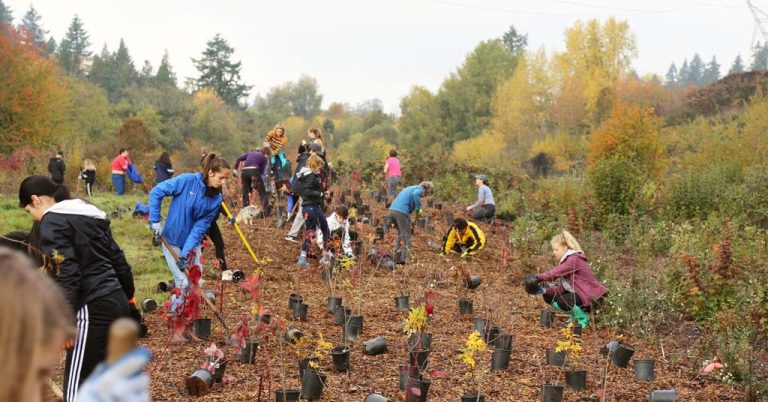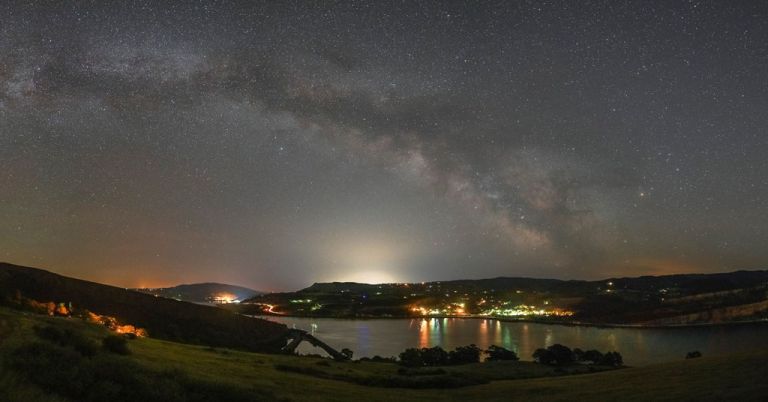Public lands took some abuse in 2020. These groups are taking on the challenge of keeping the Columbia River Gorge looking more like itself this year
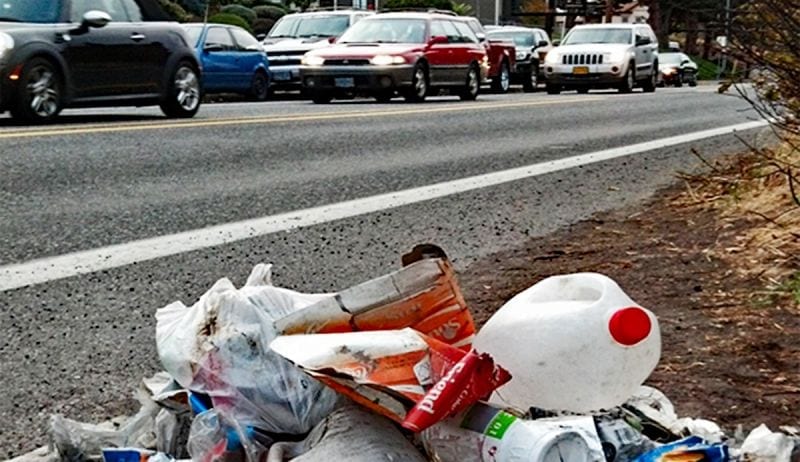
Trash hour: Litter collects on roadways throughout the Columbia Gorge National Scenic Area. Some people notice more than others. Photo by Jurgen Hess
By Lori Russell. January 14, 2021. With restrictions in Oregon and Washington in place due to the COVID-19, it could be a long winter for many residents. Come spring, wildflowers in the Columbia River Gorge will be popping, waterfalls will be gushing and people who have been cooped up at home will be heading to the region’s parks, trails and rivers.
If 2020 is a predictor of future behavior, many visitors will memorialize their visits with discarded cans, bottles and other trash. Despite executive orders closing lands and water access due to the pandemic, thousands of people converged in the Gorge last year. In April, federal, state and local agencies came together asking visitors to respect the closures and follow directives to stay home.
Sadly, perhaps predictably, reports of garbage cans overflowing at trailheads and trash dumped in campground toilets soon followed the re-opening of many public areas.
MORE: Ugh! Trash in Gorge at ‘crisis level’
Yet not all sites were equally affected. With popular trails such as Dog Mountain, Catherine Creek and Coyote Wall closed at the height of spring, litter in some parts of the Gorge was actually less than anticipated.
“At Multnomah Falls, even when we opened it under the permit system, we were bracing for the worst case and it never really happened,” says Stan Hinatsu, U.S. Forest Service recreation staff officer for the Columbia River Gorge National Scenic Area. “Forests in Oregon and Washington really got hammered, but we didn’t see that in the Gorge. Instead, city and county parks as well as the Gifford Pinchot and Mt. Hood National Forests saw increased use.”
While health and safety concerns will impact recreation in the Gorge in 2021, several volunteer organizations committed to preserving the beauty of the area are preparing to help when the garbage hits the ground.
Thrive Hood River
Thrive Hood River, a land-use advocacy group in Hood River, Oregon, has maintained three sections of Oregon Department of Transportation Adopt-A-Highway roads in Hood River County since 2009. It hosts trash pickups in the spring and fall.
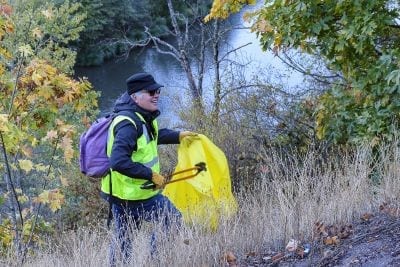
Steep task: Thrive president Peter Cornelison regularly works a stretch of steep embankment along Oregon Route 35. Photo by Jurgen Hess
“The volume of traffic and the amount of trash has been increasing through the years,” says Thrive president Peter Cornelison, who coordinates volunteer events and works directly cleaning up litter along a three-mile stretch of Oregon Route 35.
Cornelison and other volunteers often scramble 20 feet down a steep bank along Hood River to retrieve fast food cups, sheets of Styrofoam and items that fly off passing vehicles. There’s unintentional trash, too.
“We’ve found a Leatherman knife, dollar bills and all sorts of little treasures,” he says.
A Thrive crew typically collects 10-18 large bags of garbage on their busy stretch of roadway on a Sunday morning. The organization’s two other Adopt-A-Highway sections—on Route 35 and Oregon Route 281—are on flatter ground and have less trash.
“You feel great camaraderie with the people you work with and you do high fives at the end of the pickup,” says Cornelison. “I bike up Highway 35 and I can see we’ve done a good job. The trash isn’t there. As it gets further away from when we picked, you can see it accumulate again. You think of it as your little patch.”
More information on Thrive events can be found at thrivehoodriver.org.
The Dalles Beautification Committee
The Dalles Beautification Committee and Columbia Gorge Toyota Honda partnered last fall to coordinate monthly cleanup events in The Dalles, Oregon. Area residents removed litter from roadways paralleling the interstate, at the cruise ship dock along the Columbia River and downtown.
This year, local groups and businesses are being encouraged to co-host one of the cleanups in an effort to boost civic pride and engagement.
Beautification Committee member Connie Krummrich has been picking up what others leave behind on trails, in parks and around her community since she was a child. “My mom always said, ‘Leave a place cleaner than you found it,’” she says.
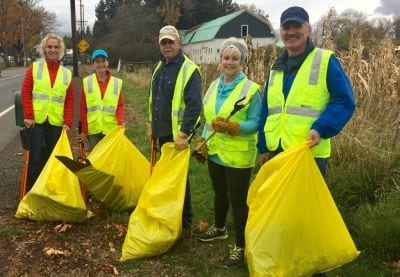
Group effort: Organizations like the Hood River Saddle Club organize volunteer cleanups throughout the year. Photo by Jurgen Hess
Over the years, Krummrich has informally “adopted” a local park and a few stretches of roadway in town where she picks up litter. The repetitive stooping and bending can be hard work.
“I like to think of it as a certain type of yoga,” she says.
Community participation amplifies the impact one person can make.
“If you have one person who works for an hour you have one hour of labor,” says Krummrich. “But if you have 16 people, you have 16 hours of labor and you can get a lot done.
“When people see other people picking up litter, they are more likely to influence some people to do it themselves. Every time we go out and do this, hopefully we are building that ethic.”
Volunteers can join cleanup efforts beginning in March on the second Saturday of the month at 10 a.m. at Thompson Park in The Dalles. Organizations interested in co-hosting a monthly cleanup should contact Rachel Carter at Columbia Gorge Toyota Honda (541-296-2271).
SOLVE
Portland-based SOLVE, an environmental stewardship group founded in 1969, brings together volunteers around Oregon to restore and preserve public lands across the state. Despite the pandemic, the organization expanded its annual Beach & Riverside Cleanup from one weekend to three in 2020.
Last year, more than 1,600 volunteers participated in 63 projects, removing an estimated 11,500 pounds of trash and marine debris from the Oregon’s beaches and watersheds.
SOLVE’s Spring Cleanup on April 17, 2021, offers volunteer opportunities throughout Oregon. The Oregon Spring Cleanup is a combination of the Spring Oregon Beach Cleanup and SOLVE IT for Earth Day. The organization also supports those who want to lead a garbage cleanup any time of year by providing volunteer outreach, event planning support and free supplies.
Details and a calendar of events can be found at solveoregon.org.
PODCAST: Overcrowding in the Columbia River Gorge
Lori Russell lives in The Dalles, Oregon.


